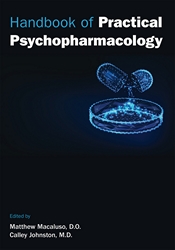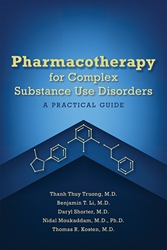Clinical Manual of Psychopharmacology in the Medically Ill, Third Edition
View Pricing
Description
With examinations of 19 new psychiatric drugs, 19 new forms of previously available drugs, and a host of new medical agents, this third edition of the Clinical Manual of Psychopharmacology in the Medically Ill has been updated to include medical and psychiatric drugs that have become available since the publication of the second edition in 2017, as well as recent relevant randomized controlled trials, systematic reviews, and meta-analyses.
Boasting all the rigor that characterized the preceding editions, every chapter in this new volume has been reviewed and revised by experts—including 11 new authors. For 15 categories of medical disorders and specialty areas that include cardiovascular disorders, oncology, obstetrics and gynecology, and substance use disorders, the book examines
- Key differential diagnostic considerations
- The evidence for the efficacy of psychiatric drugs in each disorder
- Disease-specific side effects of psychiatric drugs
- Neuropsychiatric side effects of drugs for each medical disorder
- Disease-specific alterations in pharmacokinetics
- Drug-drug interactions
Patients with medical and psychiatric comorbidity have more functional impairment, disability days, emergency department use, and rehospitalization, as well as higher medical care costs. By examining the intersection of psychiatric and medical illness, and offering easily referenced key points for each chapter, this new edition prepares both mental health practitioners and primary care physicians and internists to more safely and effectively work with patients who have psychiatric and medical illness.
Contents
- Part I: General Principles
- Chapter 1. Pharmacokinetics, Pharmacodynamics, and Principles of Drug-Drug Interactions
- Chapter 2. Severe Drug Reactions
- Chapter 3. Alternative Routes of Drug Administration
- Part II: Psychopharmacology in Organ System Disorders and Specialty Areas
- Chapter 4. Gastrointestinal Disorders
- Chapter 5. Renal and Urological Disorders
- Chapter 6. Cardiovascular Disorders
- Chapter 7. Respiratory Disorders
- Chapter 8. Oncology
- Chapter 9. Central Nervous System Disorders
- Chapter 10. Endocrine and Metabolic Disorders
- Chapter 11. Obstetrics and Gynecology
- Chapter 12. Infectious Diseases
- Chapter 13. Dermatological Disorders
- Chapter 14. Rheumatological Disorders
- Chapter 15. Surgery and Critical Care
- Chapter 16. Organ Transplantation
- Chapter 17. Pain Management
- Chapter 18. Substance Use Disorders
Contributors
- Katie S. Adams, Pharm.D.
Syed Rashdi Ahmed, M.D.
Margaret Altemus, M.D.
Rosalind M. Berkowitz, M.D.
Philip A. Bialer, M.D.
Jozef Bledowski, M.D.
Melissa P. Bui, M.D.
E. Cabrina Campbell, M.D.
Jason P. Caplan, M.D.
Stanley N. Caroff, M.D.
Catherine C. Crone, M.D.
Ericka L. Crouse, Pharm.D.
Catherine Daniels-Brady, M.D.
Elisabeth A. Dietrich, M.D.
Andrea F. DiMartini, M.D.
Andrew Drysdale, M.D., Ph.D.
Stephen J. Ferrando, M.D.
Marian Fireman, M.D.
Madhulika A. Gupta, M.D., M.Sc., FRCPC
Jennifer Kraker, M.D., M.S.
Alba Lara, M.D.
Jonathan G. Leung, Pharm.D.
James L. Levenson, M.D.
Stephan C. Mann, M.D.
Michael Marcangelo, M.D.
Curtis A. McKnight, M.D.
Sahil Munjal, M.D.
Mallay Occhiogrosso, M.D.
Kimberly N. Olson, CRNP
Jacqueline Posada, M.D.
Peter A. Shapiro, M.D.
Yvette L. Smolin, M.D.
Cullen Truett, D.O.
Christina M. van der Feltz-Cornelis, M.D., Ph.D.
Robert M. Weinrieb, M.D., FACLP
Shirley Qiong Yan, Pharm.D., BCOP
About the Authors
James L. Levenson, M.D., is Rhona Arenstein Professor of Psychiatry, Professor of Medicine and Surgery, Chair of the Division of Consultation-Liaison Psychiatry, and Vice-Chair in the Department of Psychiatry at Virginia Commonwealth University School of Medicine in Richmond, Virginia.
Stephen J. Ferrando, M.D., is Director of the Department of Psychiatry at Westchester Medical Center Health System and Edith Har Esh, M.D., Professor and Chairman in the Department of Psychiatry and Behavioral Sciences at New York Medical College in Valhalla, New York.
Related Products
Carousel Control - items will scroll by tabbing through them, otherwise arrows can be used to scroll one item at a time








